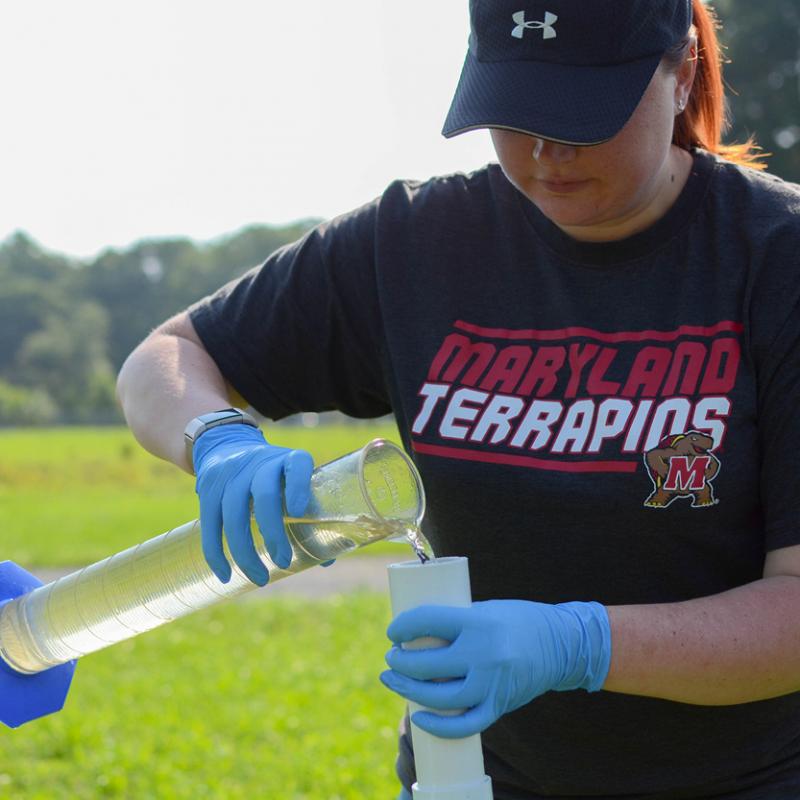
Understand and mitigate of environmental hazards to promote human health and well-being
The PhD in Environmental Health Sciences explores the impacts of environmental hazards (air, water, soil and food) on human health in the context of sociocultural, economic, work and family environments.
Perfect for...
- An individual interested in a terminal research degree for academic, federal or state careers in environmental public health
- Persons with overlapping interests in engineering, medicine, health policy, agriculture, epidemiology, computer modeling, chemistry, microbiology, or geography
Career Paths
- Employee at a state department of health
- Federal agency environmental leader
- Academic researcher
- Industry researcher
Program Overview
Students in the PhD program in Environmental Health Sciences master an essential core of knowledge in environmental and occupational health, epidemiology and biostatistics. Elective courses and rotations with faculty in field studies and laboratories offer students the knowledge and skills needed to specialize within the broader area of environmental health and become independent researchers.
See all Global, Environmental, and Occupational Health student resources.
The M.S. and Ph.D. programs in Environmental Health Sciences have a two-part application process. Applicants must submit the SOPHAS application, the centralized application service for schools and programs of public health and the UMD Supplemental application. Both applications must be submitted and verified by the scheduled deadline. Applications will be reviewed when the SOPHAS and the UMD Supplemental applications are completed.
General Admission Requirements
- A Bachelor's degree
- Minimum 3.0 undergraduate GPA
- At least one undergraduate math course (M.S. applicants)
- Transcripts from all previous coursework
- English proficiency test score (TOEFL, IELTS or PTE) (international applicants)
- Statement of purpose and objectives including career and educational goals, professional experience, and research areas of interest
Program Specific Requirements
- SOPHAS application & UMD Supplemental application
- Three letters of recommendation
- Resume or curriculum vitae
- Ph.D. applicants: a master's degree in public health or a related field preferred
- Fit between applicant's goals and expectations and program degree competencies
- Writing sample: such as a published manuscript, undergraduate or graduate thesis, research paper. If you submit a published manuscript and you are not the first author you should describe the contributions you made to the publication.
- Applicants being considered for the program will be invited for a virtual interview via Zoom.
*The review committee will evaluate GRE scores if they are submitted. The lack of scores will not impact applications. If submitted, the program considers competitive scores to be 50th percentile or higher in each of the three parts.
Note: Coursework in environmental health or science, or public health/public policy, or biological/chemical sciences, or biochemistry, or biotechnology, or engineering, or geography/geology, or math, or biostatistics, or epidemiology, or medical sciences, or anthropology, preferred.
Please visit the Course Catalog and SPH Graduate Application website for more details.
Graduate courses include
- core courses within environmental health, epidemiology and biostatistics;
- supporting courses in environmental health research, ethics, public health, and grant writing;
- specialized courses selected within the research foci; and
- dissertation credits.
Program requirements for a PhD degree also include
- successful completion of a written and oral comprehensive exam,
- oral defense of a written dissertation research proposal, and
- a minimum of 12 credits of PhD dissertation research, written dissertation and a final dissertation defense.
The program can be completed on either a full- or part time basis. It is anticipated that students will complete more than the minimum number of credits.
| Course Type | Course Title | Credits |
|---|---|---|
| Specialization Area | The specialization area would be created by and tailored to each student. If the student takes 2 lab rotations, they would take 12 credits of specialization. If they take 1 lab rotation, they would take 15 credits of specialization. | 12-15 |
| Dissertation | MIEH 899 Doctoral Dissertation Research | 12 |
| SPHL Core Courses | SPHL 602 Foundations in Epidemiology and Biostatistics | 4 |
| SPHL 603 Public Health Data Laboratory | 1 | |
| EPIB 651 Biostatistics II | 3 | |
| Cognate Area Courses | MIEH 600 Foundations of Environmental Health | 3 |
| MIEH 771 Exposure Assessment of Environmental Hazards | 3 | |
| MIEH 740 Risk Assessment | 3 | |
| MIEH 720 Principles of Toxicology | 3 | |
| MIEH 609 Methods in Environmental Health (1 or 2 rotations)** | 3 to 6 | |
| MIEH783 Proposal Development and Marketing for Public Health Scientists | 3 | |
Core Courses (23 credits): Students could waive out of some of these courses with coursework taken at UMD or in previous master's programs.
Supporting Courses (11-19 credits): Students would not be able to waive out of all rotations or seminar requirements. Rotations can in physical labs or with faculty conducting non-laboratory based research. At least 1 rotation must be outside of the student's focus area.
Specialization Area (12-15 credits): Students would not be able to waive out of any of the 12 to 15 credits required for the specialization area. No more than 6 credits of MIEH 898 can be taken as part of the specialization area.
69 credits including faculty rotations and dissertation.
*In order to meet the academic standards of MIAEH, Students must achieve a grade of B- or higher in all required courses (ie: all MIEH and SPHL courses). Failure to meet this requirement will result in the need for a student to retake a course in which they earn a C+ or lower.